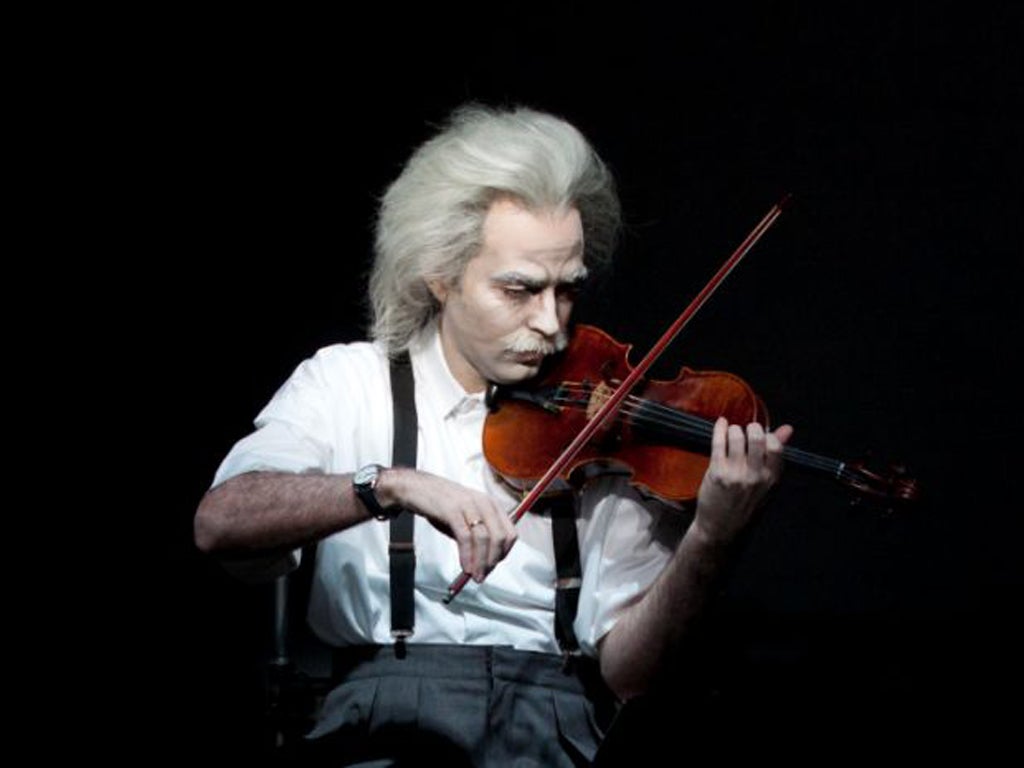Einstein on the Beach, Barbican Theatre, London Carousel, Grand Theatre, Leeds Juan Diego Florez, Royal Albert HallLondon
How do you compare multiple Einsteins? Well, it's all relative

Your support helps us to tell the story
From reproductive rights to climate change to Big Tech, The Independent is on the ground when the story is developing. Whether it's investigating the financials of Elon Musk's pro-Trump PAC or producing our latest documentary, 'The A Word', which shines a light on the American women fighting for reproductive rights, we know how important it is to parse out the facts from the messaging.
At such a critical moment in US history, we need reporters on the ground. Your donation allows us to keep sending journalists to speak to both sides of the story.
The Independent is trusted by Americans across the entire political spectrum. And unlike many other quality news outlets, we choose not to lock Americans out of our reporting and analysis with paywalls. We believe quality journalism should be available to everyone, paid for by those who can afford it.
Your support makes all the difference.Listen, play, love, revere – and keep your trap shut!" Albert Einstein's words on Bach might equally apply to Robert Wilson and Philip Glass's Einstein on the Beach, which, along with glancing references to Carole King, The Beatles and "Mr Bojangles", is threaded through with shreds of Bach's E major Partita as played by a man with a shock of white hair, a bushy moustache, and the pink, protruding tongue of a happy Labrador.
Styled after the famous 1951 photograph, this violinist (Antoine Silverman) is one of several Einsteins in Glass's non-narrative, five-hour opera. Another is the Boy (child actor Jasper Newell), besotted by steam trains on the cusp of a troubled century. The actresses in the five playlets (Helga Davis and Kate Moran) dress like Einstein. Indeed everyone on stage could be said to represent some aspect of this giant of science, from the night-train honeymooner to the tenor saxophonist (Andrew Sterman), the leaping dancers of the Lucinda Childs company, the judge, jury, female scientist, and the bus-driver (Charles Williams) who ends this five-hour marathon with the story of a perfect kiss.
Devised in 1976, Einstein is a work so content in its whimsical counterpoint of pop culture and physics, abstraction and portraiture, vignette and weltanschauung, that the presence of an audience – even one encouraged to come and go at will – is almost incidental. It is a period piece, a baby-boomer piece, written when US troops had only just left Vietnam, and is remarkably nostalgic for the picket-fence dream of pre-nuclear America.
That perfect kiss is a long time coming. Glass's dust-mote rhythmic oscillations and sun-glint shifts from E major to F minor suggest the merest curve of a narrative arc, now breaking into a toccata for electric organ, now reduced to a bare drone. The libretto darts from the Gertrude Stein-like abstractions of Christopher Knowles's poetry to incantations of solfège and numbers. Recreated for the current tour, Wilson's original staging seems as ornately codified as the coronation of a Doge. What we see is a source, the traces that John Adams, Peter Sellars and Alice Goodman would kick against with Nixon in China.
It is tantalising to imagine what Puccini might have done with Ferenc Molnar's 1909 play, Liliom. Both he and Kurt Weill wanted to adapt it but were turned down, leaving the field to Rodgers and Hammerstein, whose 1943 musical, Carousel, is the centrepiece of Opera North's summer season, with the original orchestration realised glowingly under conductor James Holmes. Director Jo Davies has created an enchanting production, picturesque in its recreation of a 1915 fairground and fishing village (designs and lighting by Anthony Ward and Bruno Poet), tempered with the sourness, violence and poverty that must have attracted Weill and Puccini to this tale of clumsy love.
Opera singers, actors, dancers and chorus members are seamlessly integrated. Eric Greene's brooding, handsome Billy Bigelow carries a difficult childhood on his shoulders and in his fists, while Gillene Herbert (Julie) and Claire Boulter (Carrie) marry for love and comfort respectively. Pure verismo to the point of Billy's suicide, Carousel abruptly becomes a story of supernatural second chances. If the first, faltering refrain of "You'll never walk alone" doesn't get you, Kim Brandstrup's exquisite ballet portrait of Billy's orphaned daughter Louise (Alex Newton) will.
In 2001, Juan Diego Florez made his Rosenblatt Recital debut at St John's, Smith Square, singing Donizetti's "Pour mon âme" to an enraptured audience of about 600. This week he repeated the feat in front of almost 10 times that number, each top C as crisp and as brilliant as ever. Superstardom generally brings with it laziness, vulgarity or both. Not so in Florez's case. Stylishly accompanied by Alessandro Vitiello and the Württembergisches Kammerorchester Heilbronn, he delivered aseries of immaculate arias from Donizetti, Bellini and Rossini, two flamboyant zarzuela numbers, and a divinely shaped "Dein ist mein ganzes Herz". So frenzied was the reception that he could have sung the Go Compare advert and brought the house down.
'Einstein' (020-7638 8891) ends today. 'Carousel' (0844 848 2701) to Sat, then touring.
Next week
Anna Picard takes a tumble with a new production of Verdi's Falstaff
Critic’s choice
The Brighton Festival enters its second week with a recital by bass Matthew Rose and pianist Malcolm Martineau, today, and The Opera Group's production of Birtwistle's Bow Down, (Thu & Fri). The Lufthansa Festival of Baroque Music opens at London's St John's, Smith Square, with a concert by violist-conductor Jordi Savall and his orchestra Le Concert des Nations (Fri).
Join our commenting forum
Join thought-provoking conversations, follow other Independent readers and see their replies
Comments